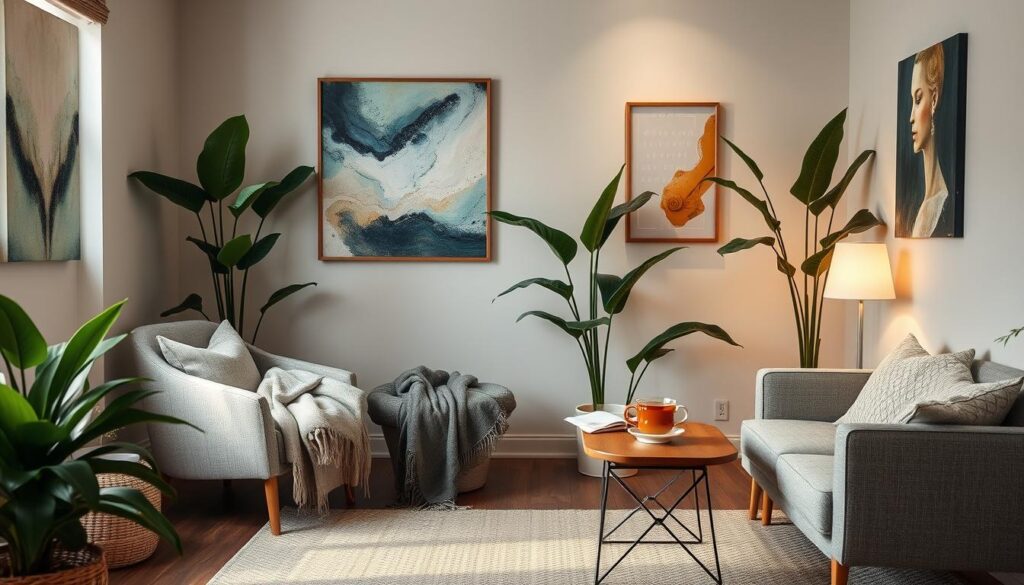In today’s fast-paced world, anxiety and stress are common. But, there are proven ways to take back control of your mental health. This guide will show you ten effective ways to reduce anxiety in your daily life. It offers practical, expert-backed techniques for achieving inner balance and a better quality of life.
Key Takeaways
- Discover effective techniques to alleviate anxiety and stress
- Explore a range of immediate relief and long-term management strategies
- Understand the mind-body connection and its impact on daily life
- Learn how to build resilience and enhance your overall well-being
- Incorporate lifestyle changes and natural remedies to support mental health
Understanding Anxiety and Stress in Modern Life
In today’s fast world, anxiety and stress are common. They affect our health, feelings, and how we connect with others. Knowing what triggers them and how they impact us is key to finding relief.
Common Triggers of Anxiety
Many things can trigger anxiety, like work stress, money worries, and social situations. Even big life changes or health issues can raise anxiety levels. Knowing these triggers is the first step to managing anxiety.
The Mind-Body Connection
Anxiety and stress affect our body as much as our mind. When we’re anxious, our body’s stress response kicks in. This can cause heart rate increases, muscle tightness, and breathing changes. Physical health issues can also make mental health worse. Understanding this connection helps us tackle anxiety from all angles.
Impact on Daily Life
Anxiety and stress can really disrupt our daily lives. They can make it hard to focus, make decisions, and enjoy social activities. They can also mess with our sleep, energy, and overall mood. Spotting these signs and tackling them is vital for a balanced life.
“The greatest weapon against stress is our ability to choose one thought over another.” – William James
Mindful Breathing Techniques for Instant Calm
In today’s fast world, it’s key to find ways to how to calm anxiety fast and handle stress. Luckily, studies show that simple mindful breathing can offer quick stress relief strategies and calm us down quickly. These methods connect our mind and body, helping us take back control and find balance in our busy lives.
Box breathing is a powerful mindful breathing method. You breathe in for 4 counts, hold for 4, breathe out for 4, and hold again for 4. This pattern helps calm our nervous system and starts our body’s relaxation response.
- Inhale for 4 counts
- Hold for 4 counts
- Exhale for 4 counts
- Hold for 4 counts
- Repeat as needed
Alternate nostril breathing is another great technique. By closing one nostril while breathing in and out, it balances our brain’s hemispheres. This leads to calm and focus.
| Breathing Technique | How It Works | Benefits |
|---|---|---|
| Box Breathing | Inhale for 4 counts, hold for 4, exhale for 4, hold for 4 | Regulates the nervous system, triggers relaxation |
| Alternate Nostril Breathing | Inhale through one nostril, exhale through the other | Balances the brain, promotes calm focus |
Adding these mindful breathing practices to your daily life can quickly how to calm anxiety fast. You’ll see benefits like less anxiety, better focus, and improved emotional control. Your overall well-being will also improve.
“Breathing is the foundation of all meditative practices. It is the bridge between our conscious and unconscious minds.”
Regular Exercise as a Natural Stress Reducer
Regular physical activity is a great way to lower stress and boost mental health. It offers many benefits for both body and mind. This makes it key for managing anxiety and stress.
Best Exercise Types for Anxiety Relief
Some exercises are better than others for easing anxiety and stress. Activities like brisk walking, jogging, cycling, and swimming can lower cortisol and release endorphins. Strength training also helps, as it calms the nervous system with rhythmic movements and muscle contractions.
Creating a Sustainable Workout Routine
To enjoy exercise’s stress benefits, create a consistent routine. Aim for at least 30 minutes of activity most days. Finding an activity you genuinely enjoy makes it easier to keep up with your routine.
Combining Movement with Mindfulness
- Adding mindfulness practices like deep breathing, meditation, or yoga to your routine boosts stress relief.
- Mixing physical activity with mindfulness helps you stay present, reduces negative thoughts, and increases calm and well-being.
By making exercise a regular part of your life, you can use natural ways to reduce stress and better your mental health. Try different activities to find what works for you. Make sure your routine is sustainable and includes mindfulness practices.
Establishing Healthy Sleep Patterns
Quality sleep is key for our mental health. Not getting enough rest can lead to anxiety and stress. So, making healthy sleep habits a priority is important for anyone wanting to beat anxiety and boost mental health.
Keeping a regular sleep schedule is a great start. Going to bed and waking up at the same time every day helps our body’s natural rhythm. This makes it easier to fall and stay asleep.
It’s also important to make your bedroom sleep-friendly. Keep it cool, dark, and quiet. Avoid using electronic devices before bed. Try relaxing activities like reading or meditation to get ready for sleep.
Regular exercise can also help you sleep better. Physical activity during the day can reduce stress and improve sleep. Just remember to avoid intense workouts before bed, as they can keep you awake.
By focusing on quality sleep, you can take a big step towards managing anxiety and improving mental health. Simple changes in your lifestyle can lead to better sleep. This will make you feel rested, refreshed, and ready to face daily challenges.
Tips for Improving Sleep Quality
- Maintain a consistent sleep schedule, even on weekends
- Create a sleep-friendly environment: cool, dark, and quiet
- Avoid electronic devices before bedtime
- Engage in relaxing activities like reading or gentle stretching
- Exercise regularly, but avoid intense workouts close to bedtime

10 Effective Ways to Reduce Anxiety and Stress
Modern life can be overwhelming, leading to anxiety and stress. But, there are proven ways to manage anxiety and find calm. These strategies can help you build resilience and improve your well-being. Learn how to cope with anxiety and stress effectively.
Immediate Relief Strategies
When anxiety hits, quick relief is key. Deep breathing exercises can instantly calm you down. Mindfulness meditation keeps you focused on the present. A short walk or light stretches can also soothe your mind and body.
Long-term Management Approaches
For lasting relief, make sustainable lifestyle changes. Regular exercise, balanced diet, and quality sleep boost mental health. Journaling, hobbies, and loved ones also help manage stress over time.
Building Resilience
Building emotional resilience is crucial. Self-compassion, setting boundaries, and saying no help you face challenges. Professional support, like therapy, is also important for your mental health.
“The greatest weapon against stress is our ability to choose one thought over another.” – William James
By using these anxiety management techniques, you can reduce stress and improve your life. Take proactive steps to build resilience and enhance your well-being.
Nutrition and Diet’s Role in Mental Wellness
The food we eat is key in natural ways to reduce stress and ease anxiety. Research shows a strong link between diet and mental health. It highlights how certain foods can greatly affect our mood.
For mental wellness, a balanced diet is essential. Foods like fatty fish, walnuts, and flaxseeds are good for our mood. They have anti-inflammatory effects. Also, eating whole grains and legumes helps make serotonin, which is good for our mood.
| Nutrient | Benefit for Mental Health |
|---|---|
| Omega-3 Fatty Acids | Reduced inflammation, improved mood regulation |
| Vitamin B Complex | Enhanced cognitive function, reduced stress response |
| Magnesium | Improved sleep quality, decreased anxiety levels |
| Probiotics | Improved gut-brain connection, reduced anxiety and depression |
Eating a variety of whole foods also helps our mental health. By choosing the right foods, we can manage our mental health better. This improves our overall life quality.
Remember, while diet is a crucial element, it should be combined with other lifestyle modifications and, if necessary, professional support to achieve optimal mental wellness.
Creating Boundaries and Time Management
In today’s fast world, setting boundaries and managing time well is key. It helps us reduce stress and keep balance. By setting realistic goals and strategies, we can take back control of our days. This leads to better mental health.
Setting Realistic Expectations
Unrealistic expectations cause a lot of stress. It’s important to aim for achievable goals. Remember, you can’t be perfect all the time. By managing your tasks and focusing on what’s important, you can ease the pressure.
Work-Life Balance Strategies
- Make clear lines between work and personal time. Don’t work during family or free time.
- Make sure to take breaks and vacations. They help you recharge.
- Share tasks or responsibilities. It can make your life easier and give you time for yourself.
Digital Detox Benefits
A digital detox can greatly reduce stress and clear your mind. Taking a break from screens and social media makes you more present. It boosts productivity, sleep, and overall well-being.
| Benefits of a Digital Detox | Impact on Stress Reduction |
|---|---|
| Improved focus and concentration | Increased productivity and sense of accomplishment |
| Better sleep quality | Reduced anxiety and restlessness |
| Reduced feelings of FOMO (Fear of Missing Out) | Increased mindfulness and presence |
By using these strategies, you can actively reduce stress. You’ll move towards a healthier, more balanced life.
Professional Support and Therapy Options
When self-help isn’t enough, getting professional help is key for managing anxiety and stress. This section looks at various therapy options that offer effective ways to reduce anxiety. These methods help people find long-term strategies to lower stress levels.
Cognitive-Behavioral Therapy (CBT) is a well-known method. It helps people change negative thought patterns that lead to anxiety. With a licensed therapist, clients learn to manage their emotions better and find healthier ways to cope.
Mindfulness-based therapies, like Mindfulness-Based Stress Reduction (MBSR) and Acceptance and Commitment Therapy (ACT), focus on being present and accepting. These techniques are great for those looking to reduce anxiety and build emotional strength.
For those interested in alternative methods, art therapy, music therapy, and somatic therapy are options. These holistic approaches use mind-body practices to tackle anxiety and stress from different angles.
Choosing professional support is a big step towards managing anxiety and improving mental health. It shows courage and can lead to significant positive changes.
“Seeking professional help is a sign of strength, not weakness. It takes courage to acknowledge the need for support, and the benefits can be truly life-changing.”

Natural Remedies and Holistic Approaches
Managing anxiety and stress can be done naturally. These methods help balance, reduce tension, and improve well-being. Let’s look at some effective ways to lower stress and ease anxiety.
Herbal Supplements for Anxiety
Herbal supplements like chamomile, lavender, valerian root, and ashwagandha are calming. They help soothe the mind, lower cortisol, and support relaxation.
Alternative Healing Methods
Methods like acupuncture, meditation, and aromatherapy also help with anxiety and stress. They aim to balance, promote mindfulness, and trigger the body’s relaxation response.
Lifestyle Modifications
- Prioritize sleep and establish a consistent sleep routine.
- Incorporate regular exercise into your daily routine, such as yoga, tai chi, or brisk walking.
- Adopt a healthy, balanced diet rich in whole foods, antioxidants, and anti-inflammatory ingredients.
- Practice stress-reducing techniques like deep breathing, progressive muscle relaxation, or mindfulness meditation.
- Limit caffeine, alcohol, and nicotine consumption, as they can exacerbate anxiety and stress.
Exploring natural ways to reduce stress and ease anxiety can improve your mental and emotional health. Everyone is different, so try various methods to find what works for you.
“The greatest weapon against stress is our ability to choose one thought over another.” – William James
Conclusion
Managing anxiety and stress well needs a mix of strategies. By using effective anxiety management techniques, you can find a balance. This balance helps reduce stress and improve mental health.
From mindful breathing to regular exercise, healthy sleep, and professional help, each method is important. They all help build resilience and well-being.
It’s important to try different methods and see what works best for you. Remember, what helps one person might not help another. Stay open, be patient, and keep looking into new ways to manage stress.
By taking a holistic approach to reducing stress and improving mental health, you can take back control. You can live a more balanced and fulfilling life. Celebrate your wins and don’t be afraid to ask for help when you need it.
Together, we can face the challenges of today and come out stronger, healthier, and more resilient than ever.
FAQ
What are some effective ways to reduce anxiety and stress?
Effective ways to lower anxiety and stress include mindful breathing, regular exercise, and good sleep. Setting boundaries and managing time well is also key. Seeking professional help and trying natural remedies can also help.
How can mindful breathing help calm anxiety?
Mindful breathing exercises calm anxiety by activating the parasympathetic nervous system. Techniques like diaphragmatic breathing and guided visualization promote relaxation. They help manage stress responses.
What types of exercise are most effective for reducing anxiety?
Yoga, Tai Chi, and certain dances are great for anxiety relief. They combine physical movement with mindfulness. Aerobic activities like walking, running, and swimming also lower stress.
How can creating boundaries and better time management help manage anxiety?
Setting realistic expectations and maintaining a work-life balance can reduce anxiety. Taking digital breaks is also helpful. Prioritizing self-care and setting boundaries improves mental well-being.
What natural remedies and holistic approaches can be used to ease anxiety?
Herbal supplements like chamomile, lavender, and valerian root can help. Acupuncture and aromatherapy are also options. Adopting a balanced diet and practicing relaxation techniques are beneficial.
When should someone seek professional support for their anxiety?
If self-help doesn’t work or anxiety affects daily life, seek professional help. A therapist or counselor can offer treatments like cognitive-behavioral therapy (CBT) or mindfulness-based interventions.
